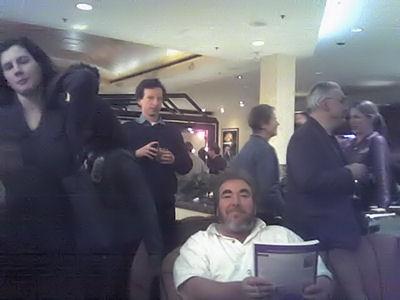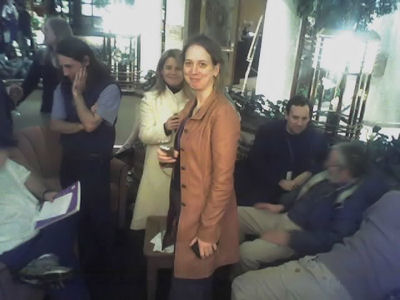- Congratulations to our own Paul Kiparsky, who was recognized as
a Fellow of the Linguistic Society of America at its recent meeting in
Anaheim. This award is made to an elite set of LSA members who `have
made distinguished contributions to the discipline'. Mazel Tov!

Paul V. Kiparsky: LSA Fellow
- And the Anaheim meetings were chock full of Stanford papers.
Hope you had a chance to check 'em out:
- Phonology: An Appraisal of the Field in 2007 Organizers. Discussants: Abigail Cohn, Bruce Hayes, Larry Hyman, Paul Kiparsky, and Donca Steriade
- The Role of Previous Form in Predicting NP Form in Vernacular Written Cantonese. Rebecca Starr
- A Formal Analysis of the Verb Copy Construction in Chinese. Ji Fang and Peter Sells
- Integrating social information into sociolinguistic comprehension. Kathryn Campbell-Kibler
- The Function of English Contrastive Reduplication: Evidence from Homonyms. Laura Whitton
- Word stress in Finnish. Arto Anttila
- OCP effects in Dagaare. Arto Anttila and Adams Bodomo
- What Does THAT Mean? Experimental Evidence Against the Principle of No Synonymy. Rafe Kinsey, Tim Florian Jaeger, and Thomas Wasow
- English yes-no questions: variation in adult input and criteria for acquisition. Bruno Estigarribia
- Aki the Predicator: A Unified Analysis of Niuean Instrumentals. Douglas Ball
- Derivational morphology and mixed category constructions. Tatiana Nikitina
- Verbs, Sources and Goals. Vivienne Fong
- `Agentive' For-Phrases in Middles. Nola Stephens
- Semantic structure and argument realization in (mostly Hebrew) existentials. Itamar Francez
- The phonetics of laryngealization in Yucatec Maya. Heriberto Avelino, Sam Tilsen, Eurie Shin, and Reinko Kataoka
- The Effect of Lexical Frequency on Tone Production. Yuan Zhao
- Attitudes, gradability and entailment. Graham Katz
- Controlling Processing Factors in the Study of Subjacency. Ivan Sag, Philip Hofmeister, Neal Snider, and Perry Rosenstein
- Facilitating Retrieval of Wh-Phrases. Philip Hofmeister
- Evidence from Priming for Hierarchical Representation in Syntactic Structure. Neal Snider
- Multiple features, multiple identities: A sociophonic profile of Condoleezza Rice. (ADS). Robert Podesva, Jason Brenier, Lauren Hall-Lew, Stacy Lewis, Patrick Callier, and Rebecca Starr.
- And let's not forget all our distinguished alums who gave papers in Anaheim:
- The Role of Durativity in Argument Realization. John Beavers
- Variation and social networks during language change. Brady Clark, Matthew Goldrick, and Celina Troutman.
- Lexical and sentential aspect in Indian English tense-aspect restructuring. Ashwini Deo and Devyani Sharma
- Tense or Grammatical Aspect? Guarani Nominal Temporal Suffixes. Judith Tonhauser
- Towards a typology of causee case-marking. Cathryn Donohue
- Social Meaning in the Interaction of Variables. Robert Podesva
- Never around the barns: Gendered linguistic practices in dairy country. Mary Rose
- Why is that speaker disfluent? The role of attribution in the effect of disfluency on comprehension. Jennifer Arnold, Carla Hudson- Kam, and Michael Tanenhaus.
- Usage or Grammar? Comprehension and production share access to same probabilities. T. Florian Jaeger
- Temporal interpretation in Guarani: The effect of telicity & durativity. (SSILA) Judith Tonhauser
- Orthodox Jewish American English. (ADS) Sarah Bunin Benor
- Stanford rocks!
- HEARD ON CAMPUS:
`Stanford has a product. A lot of people don't know this. We produce a product, and our product is the future.' -- Brian Carilli, lab designer in the School of Engineering, and one of two recipients of this year's Marsh O'Neill Award. -
Stanford Blood Center: Shortage of
O-, A, B-, and AB-. For an appointment:
http://bloodcenter.stanford.edu/ or call 650-723-7831. It only takes
an hour of your time and you get free cookies.




Department News

Caught in the Act

Taking Names and Drink Orders in Anaheim
The Anaheim LSA Stanford Reunion was a great success. All it took to lure our students and alums was the offer of a free drink! But we got more than just those hankering after the free hooch -- also present were numerous faculty (regular, consulting, and visiting; past and present), Dikran Karagueuzian (Director of CSLI Publications), and a few other friends, including Melanie Levin (behind Judith in the picture below), who is now (in case you didn't know) doing what she used to do for us at the UCLA Linguistics Department! (parser check -- attach high...) [Thanks to Mary Rose and Judith Tonhauser for the photographic contributions.]

The Stanford Linguistics Reunion in Anaheim

Letters to the Editor
Although recruitment efforts to our PhD program have been extraordinarily successful in recent years, one must always keep pace with technological advancement, and recent revelations suggest that our department may be falling behind the times. Some PhD programs in economics, at least, have turned to video as recruitment tools. Although some have mocked these efforts (see also here and here), I believe that given Stanford's location in the heart of silicon valley, we must keep pace with these advances in technology. So, I think the Sesquiped should solicit nominations for makers of the recruiting video. I, for my part, nominate the chair of the department and the chair of the admissions committee.
A concerned student
[Dear concerned student. Those are amazing! Should we be the first? Or should we wait for other linguistics departments to venture into video promotion and then make fun of them? You make the call...]

Food for Thought
The final word on nutrition and health, combining the results of many independent health studies (with thanks to Susan Fischer):
- The Japanese eat very little fat and suffer fewer heart attacks than the Canadians, British, Australians or Americans.
- The Mexicans eat a lot of fat and suffer fewer heart attacks than the Canadians, British, Australians or Americans.
- The Chinese drink very little red wine and suffer fewer heart attacks than the Canadians, British, Australians or Americans.
- The Italians drink excessive amounts of red wine and suffer fewer heart attacks than the Canadians, British, Australians or Americans.
- The Germans drink a lot of beer and eat lots of sausages and fats, and suffer fewer heart attacks than the Canadians, British, Australians or Americans.
- The Ukrainians drink a lot of vodka, eat a lot of perogies and cabbage rolls and suffer fewer heart attacks than the Canadians, British, Australians or Americans.
- Conclusion: Eat and drink what you like. Speaking English is apparently what kills you.

Goings-On
- FRIDAY, 12 JANUARY
Speech Lunch
No Meeting today
Linguistics Department Colloquium
15:30 in MJH 126
Philip Hofmeister
Facilitating Memory Retrieval in Language Comprehension
(Dissertation Proposal)
Weekly Social
17:00 in the department lounge. Gourmet delights from the Social Committee.
- MONDAY, 15 JANUARY
Martin Luther King Junior Day. No classes. Go away! Enjoy yourself! Do something special! Get out of Palo Alto! No excuses! - WEDNESDAY, 17 JANUARY
Morrison Institute Colloquium
16:15 in Herrin T-175
R. Stephen Lansing (U. Arizona and Santa Fe Institute)
Village Assembly, Language Speciation, and the Neutral Theory in IndonesiaGroup in American Indian Languages (GAIL), UC Berkeley
18:00, Location TBA
Keren Rice, University of Toronto
Activity incorporates and middle voice in some Athabaskan languagesDeptflix Night
19:00 in MJH 126
Sideways
See a great flick with a great audience...
- Thursday, 18 JANUARY
Symbolic Systems Forum
16:15 in 380:380C (Math Corner)
Don Norman (Northwestern University)
Cautious Cars & Cantankerous Kitchens: Apply Cognitive Science to Everyday LifeStanford Speech and Language Tea (SPLAT)
17:00 in MJH 126
TBA
- Friday, 19 JANUARY
-
Linguistics Department Colloquium
15:30pm. MJH 126
Keren Rice (U. of Toronto)
Title TBA Weekly Social
17:00 in the department lounge. Gourmet delights from the Social Committee.
-
- Saturday, 20 JANUARY
The (Un)usual Events Fest
All day in MJH 126

Upcoming
- For local linguistic events, always consult the Department's
event page, available RIGHT HERE
- Got broader interests? The New Sesquiped recommends reading or even
subscribing to the CSLI Calendar, available HERE.
- What's happening at UC Santa Cruz? Find out HERE.
- What's going on at UC Berkeley? Check it out HERE.

Want to contribute information? Want to be a reporter? Want to see something appear here regularly? Want to be a regular columnist? Want to take over running the entire operation? Contribute something at the top of this page or write directly to sesquip@gmail.com.

Vol. 3, Issue 11
Vol. 3, Issue 10
Vol. 3, Issue 9
Vol. 3, Issue 8
Vol. 3, Issue 7
Vol. 3, Issue 6
Vol. 3, Issue 5
Vol. 3, Issue 4
Vol. 3, Issue 3
Vol. 3, Issue 2
Vol. 3, Issue 1
Vol. 2, Issue 2
Vol. 2, Issue 1
Vol. 1, Issue 3
Vol. 1, Issue 2
Vol. 1, Issue 1
Editor in Chief:
Ivan A. Sag
Design and Production Consultant:
Philip Hofmeister
Reporters:
Andrew Koontz-Garboden
Newsletter Committee: Scott Grimm, Graham Katz, Ani Nenkova
Inspiration:
Melanie Levin and Kyle Wohlmut